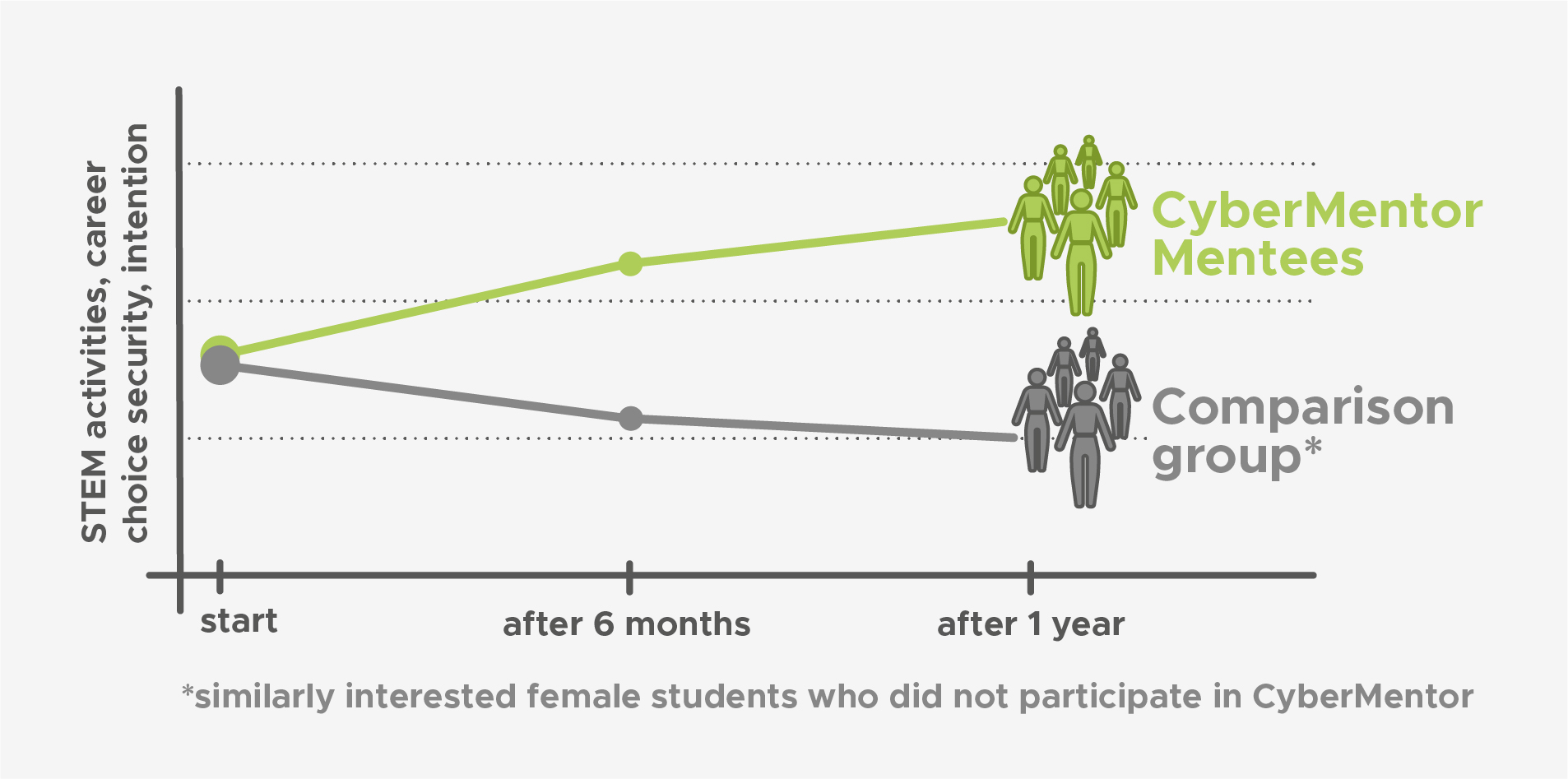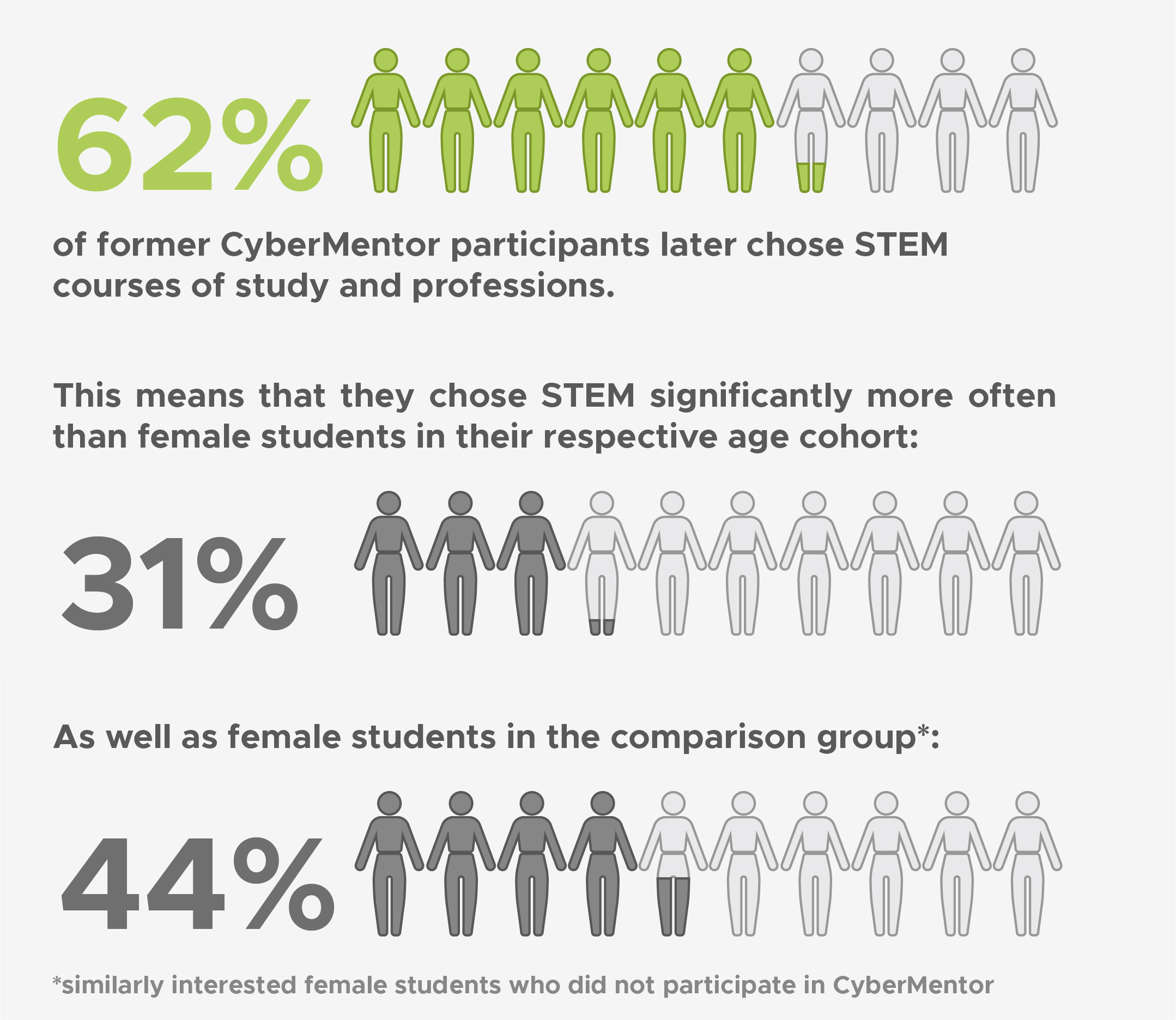Research
Research Design
The profound and comprehensive accompanying research at CyberMentor provides insights into successful mentoring processes which are used for the continuous improvement of the program. The results are made available to other mentoring programs in scientific publications. The four most important components of the accompanying research are:
(1) longitudinal monitoring of program participants over at least three measurement points, and, in some cases, over several years,
(2) impact measurement by using several comparison groups,
(3) extensive data collection using standardized scales, and
(4) the combination of several data collection methods.
(1) longitudinal monitoring of program participants over at least three measurement points, and, in some cases, over several years,
(2) impact measurement by using several comparison groups,
(3) extensive data collection using standardized scales, and
(4) the combination of several data collection methods.
Implementation
Some mentoring programs measure their success based on participant satisfaction. However, it is known that the success of the mentoring programs is often greatly overestimated due to a meresatisfaction survey. For this reason, CyberMentor is particularly interested in examining how certain participant characteristics change over the course of the mentoring.
To test the effectiveness of the program, several variables such as interest in STEM, confidence in one's STEM abilities, knowledge of STEM fields of study and careers, intention to study a STEM subject, STEM activities, and several aspects of the students' home and school environments are surveyed using standardized scales. To study their development, participants are followed longitudinally over several measurement points. Surveys are conducted using online questionnaires before the mentoring begins, during the mentoring year, and after the mentoring ends.
In addition, feedback questionnaires are collected to assess the mentoring round. Follow-up surveys are partially conducted with former mentees to record actual decisions regarding study and career choices.
To test the effectiveness of the program, several variables such as interest in STEM, confidence in one's STEM abilities, knowledge of STEM fields of study and careers, intention to study a STEM subject, STEM activities, and several aspects of the students' home and school environments are surveyed using standardized scales. To study their development, participants are followed longitudinally over several measurement points. Surveys are conducted using online questionnaires before the mentoring begins, during the mentoring year, and after the mentoring ends.
In addition, feedback questionnaires are collected to assess the mentoring round. Follow-up surveys are partially conducted with former mentees to record actual decisions regarding study and career choices.

Impact measurement using a comparison group
The participants’ development is compared with three comparison groups. The first comparison group is a group of girls who have registered for the program but will not be admitted to the program until the next round due to limited places. These girls show a comparable interest in STEM as the participating female students. The other two comparison groups consist of one group of girls and one group of boys who have an average interest in STEM. The participants and the comparison groups receive the identical questionnaires at fixed times. All data are stored and analyzed in anonymized form. From a research perspective, the comparison of the participating mentees with female students in the comparison group with similar interests represents a special feature in the research design compared to existing research: It allows for an actual proof of impact of the CyberMentor program, as a comparison is made to female students with comparable prerequisites who, however, cannot benefit from mentoring.
Results
Compared to similarly STEM-interested female students who signed up for CyberMentor but were unable to participate until a year later, CyberMentor participants show:
- a significant increase in STEM activities,
- a higher degree of certainty in career choices, and
- an increasing intention to study a STEM subject.

Follow-up surveys with former mentees regarding study and career choices show the following results:
62 percent of former female participants later chose STEM majors and careers. This means they were twice as likely to choose STEM as female students in their respective age cohorts (31%).


Publications
Stoeger, H., Duan, X., Schirner, S., Greindl, T., & Ziegler, A. (2013). The effectiveness of a one-year online mentoring program for girls in STEM. Computers & Education, 69, 408–418. https://doi.org/10.1016/j.compedu.2013.07.032
Stoeger, H., Schirner, S., Laemmle, L., Obergriesser, S., Heilemann, M., & Ziegler, A. (2016). A contextual perspective on talented female participants and their development in extracurricular STEM programs. Annals of the New York Academy of Sciences, 1377(1), 53–66. https://doi.org/10.1111/nyas.13116
Stoeger, H., Hopp, M., & Ziegler, A. (2017). Online mentoring as an extracurricular measure to encourage talented girls in STEM (science, technology, engineering, and mathematics): An empirical study of one-on-one versus group mentoring. Gifted Child Quarterly, 61(3), 239-249. https://doi.org/10.1177/0016986217702215
Stoeger, H., Debatin, T., Heilemann, M., & Ziegler, A. (2019). Online Mentoring for Talented Girls in STEM: The Role of Relationship Quality and Changes in Learning Environments in Explaining Mentoring Success. New Directions for Child and Adolescent Development, 2019(168), 75–99. https://doi.org/10.1002/cad.20320
Hopp, M. D. S., Stoeger, H., & Ziegler, A. (2020). The Supporting Role of Mentees’ Peers in Online Mentoring: A Longitudinal Social Network Analysis of Peer Influence. Frontiers in Psychology, 11. https://doi.org/10.3389/fpsyg.2020.01929
Stoeger, H., Heilemann, M., Debatin, T., Hopp, M. D. S., Schirner, S., & Ziegler, A. (2021). Nine years of online mentoring for secondary school girls in STEM: an empirical comparison of three mentoring formats. Annals of the New York Academy of Sciences, 1483(1), 153–173. https://doi.org/10.1111/nyas.14476
Stoeger, H., Debatin, T., Heilemann, M., Schirner, S., & Ziegler, A. (2023). Online mentoring for girls in secondary education to increase participation rates of women in STEM: A long‐term follow‐up study on later university major and career choices. Annals of the New York Academy of Sciences, 1523(1), 62–73. https://doi.org/10.1111/nyas.14989
Uebler, C., Emmerdinger, K. J., Ziegler, A., & Stoeger, H. (2023). Dropping out of an online mentoring program for girls in STEM: A longitudinal study on the dynamically changing risk for premature match closure. Journal of Community Psychology, 51(8), 3121–3151. https://doi.org/10.1002/jcop.23039
Stoeger, H., Schirner, S., Laemmle, L., Obergriesser, S., Heilemann, M., & Ziegler, A. (2016). A contextual perspective on talented female participants and their development in extracurricular STEM programs. Annals of the New York Academy of Sciences, 1377(1), 53–66. https://doi.org/10.1111/nyas.13116
Stoeger, H., Hopp, M., & Ziegler, A. (2017). Online mentoring as an extracurricular measure to encourage talented girls in STEM (science, technology, engineering, and mathematics): An empirical study of one-on-one versus group mentoring. Gifted Child Quarterly, 61(3), 239-249. https://doi.org/10.1177/0016986217702215
Stoeger, H., Debatin, T., Heilemann, M., & Ziegler, A. (2019). Online Mentoring for Talented Girls in STEM: The Role of Relationship Quality and Changes in Learning Environments in Explaining Mentoring Success. New Directions for Child and Adolescent Development, 2019(168), 75–99. https://doi.org/10.1002/cad.20320
Hopp, M. D. S., Stoeger, H., & Ziegler, A. (2020). The Supporting Role of Mentees’ Peers in Online Mentoring: A Longitudinal Social Network Analysis of Peer Influence. Frontiers in Psychology, 11. https://doi.org/10.3389/fpsyg.2020.01929
Stoeger, H., Heilemann, M., Debatin, T., Hopp, M. D. S., Schirner, S., & Ziegler, A. (2021). Nine years of online mentoring for secondary school girls in STEM: an empirical comparison of three mentoring formats. Annals of the New York Academy of Sciences, 1483(1), 153–173. https://doi.org/10.1111/nyas.14476
Stoeger, H., Debatin, T., Heilemann, M., Schirner, S., & Ziegler, A. (2023). Online mentoring for girls in secondary education to increase participation rates of women in STEM: A long‐term follow‐up study on later university major and career choices. Annals of the New York Academy of Sciences, 1523(1), 62–73. https://doi.org/10.1111/nyas.14989
Uebler, C., Emmerdinger, K. J., Ziegler, A., & Stoeger, H. (2023). Dropping out of an online mentoring program for girls in STEM: A longitudinal study on the dynamically changing risk for premature match closure. Journal of Community Psychology, 51(8), 3121–3151. https://doi.org/10.1002/jcop.23039
